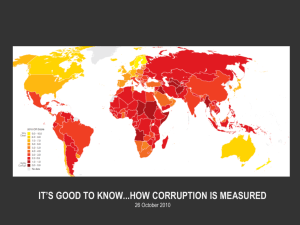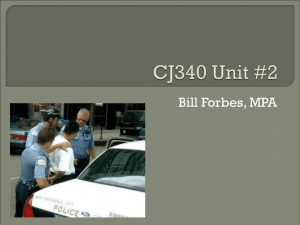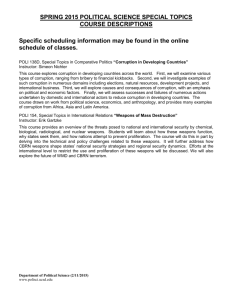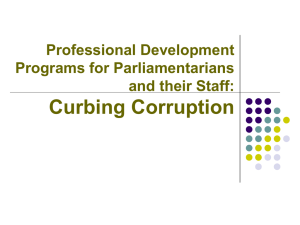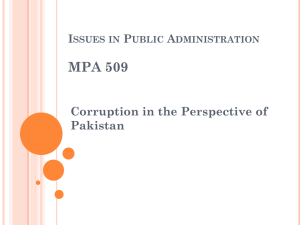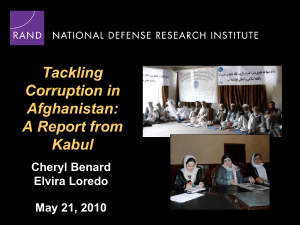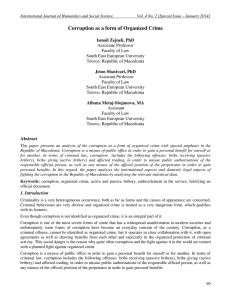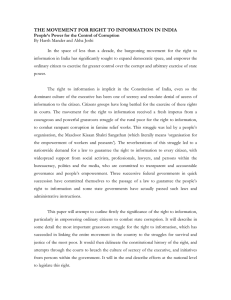CORRUPTION RISKS & PREVENTION STRATEGIES IN FINANCIAL
advertisement
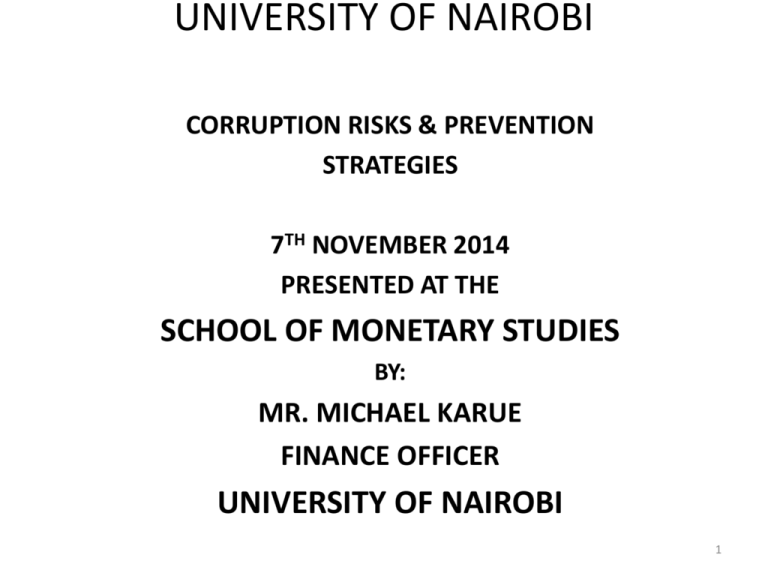
UNIVERSITY OF NAIROBI CORRUPTION RISKS & PREVENTION STRATEGIES 7TH NOVEMBER 2014 PRESENTED AT THE SCHOOL OF MONETARY STUDIES BY: MR. MICHAEL KARUE FINANCE OFFICER UNIVERSITY OF NAIROBI 1 PRESENTATION OUTLINE Definitions Types of corruption Manifestation of Corruption Pressure to Commit corruption/crime Red flags How to address loopholes Conclusion 2 2 DEFINATIONS Abuse of public power for private gain Misuse of public power, office, or authority for private benefit The abuse of power for personal gain or for the benefit of a group to which one owes allegiance 3 TYPES OF CORRUPTION Grand corruption – Goldenberg level Petty Corruption – misuse of petty cash, misuse of office telephone, stationary (printing private work), bribes before service delivery, use of labs for private consultancies Using office equipments for personal gain Quotation fixing 4 Manifestations of Corruption –The Integrity Question •Weak Financial systems •Fraudulent transactions- Submitting false claims e.g Dental/ spectacles •Bribes & Kickbacks- before offering services in the office •Fraud – misuse of property and cash •Favoritism – financial benefits / opportunities/ trips •Embezzlement of funds – Revenue at cash collection points •Breach of Trust - leaking of confidential information •Tax Evasion e.g. accepting payments that have not been taxed5 CONTINUED •Weak and questionable caliber of staff •Intimidation of junior staff by their superiors •Hiding/ Loss of documents •Abuse of office e.g. misuse of discretionary powers •Payroll management – inserting un authorized employees •Creative accounting - presentation doctored petty cash recoupment or accounting for advances •Donor funded projects – accounting for advances •Devolved funds such as e.g. Bursary, CDF – mode of selection of beneficiaries •Stores- accounting for fixed assets and consumable e.g Equipments bought under projects 7 6 PRESSURE TO COMMIT CRIME •Professional integrity •Poor cultural values/traditions •Weak disciplinary system- skewed decisions selectively •Need to maintain expensive vehicles, lifestyle – dressing, clubs, food •Family pressure – children education, Residence •Extra families and their needs- more than one •Gambling & Drugs addicts •Weak internal controls – exploit weaknesses •Weak internal audit function - reactive 7 RED FLAGS Staying in Office unnecessarily too long Not taking leave Overfriendliness with clients- darling of all Creating emergencies in order to by pass Financial and Procurement procedures Tendency to follow up requests for authorization at very short notice Extravagant lifestyle Senior officers doing menial assignment 8 HOW TO ADDRESS CORRUPTION LOOPHOLES •Maintain proper , accurate and up to date records •Adherence to policies and procedures- e.g. recruitment, budgeting •Formulate, implement and enforce policies and procedures manuals across functions in the University •Proper budgeting and budgetary control •Enhance discipline/prudence in management & use of UON resources •Strengthen supervision of staff e,g cashiers •Proper monitoring of existing procedures 11 9 CONTINNUED. •Managers should be role model & provide leadership to staff under them •Regular review of Internal Control systems within the University •Proper functioning audit department •Regular staff rotation within the University •Appreciate and reward hard work, honesty and integrity •Keep constant watch over staff in their duty station supervision •Ensure committees of the Council including Audit Committee are in place and discharging their responsibilities as per statutes •Improve organization culture in the University towards a more responsible Citizenship 10 BENEFITS OF PREVENTING CORRUPTION • Economic growth in the country • Increased Domestic & Foreign Investment – confidence in the systems • Improved social behavior & moral standards • Confidence by development partners • Fair play in public institutions • Efficient service delivery from public service • Improved infrastructure • Improved justice system/ rule of law • Enhanced public safety & security 11 Q &A THANK YOU ALL 12



